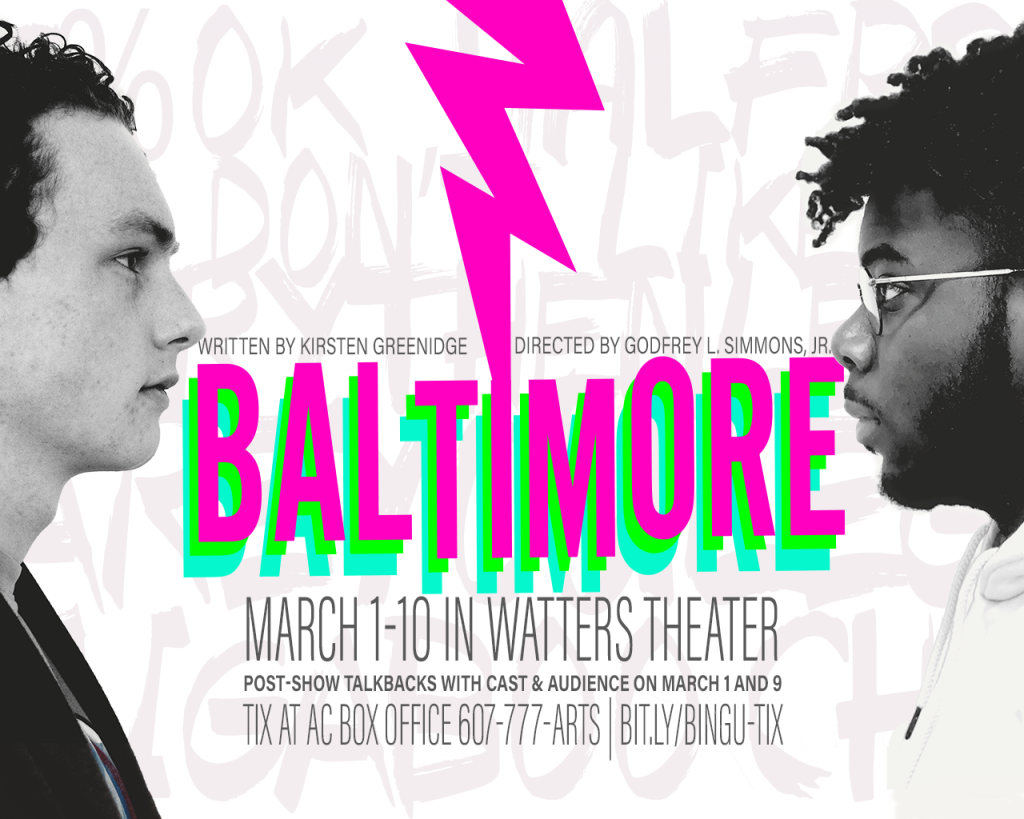
To kick off its spring season, Binghamton University’s theatre department will tackle “Baltimore,” a play that almost blurs the line between a Mainstage production and the everyday life of a student of color. The Kirsten Greenidge play is set at a college not unlike BU and follows the campus community dealing with a racist act committed on school grounds. Guest-directing the production is Godfrey L. Simmons Jr., a senior lecturer in acting at Cornell University’s department of performing and media arts.
The subject matter of “Baltimore” clearly calls for a diverse cast. Fortunately, BU’s multicultural community really showed up for auditions — 45 percent of the people who auditioned were people of color. According to Cindy Dias, an assistant director of the show and a sophomore majoring in theatre, “Baltimore” will feature the largest cast of color the theatre department has seen in a long time. To add to the significance, the play’s opening night falls on March 1, which is Zero Discrimination Day.
In the play, Robert Edwards portrays Bryant, a college freshman who begins to develop feelings for a girl. Those feelings get complicated, however, when Bryant realizes that his potential love interest is racist. Edwards, a senior majoring in theatre who has acted in many Mainstage productions before, said he related to Bryant on a very personal level.
“It’s difficult being so close to the subject and not being uncomfortable to the point where the story can’t be told,” Edwards said. “Because as a college-aged male, a black male, I relate to my character in that aspect and like, these are things that I’ve had to deal with in my life.”
Both Dias and Edwards emphasized the importance of getting more students of color involved in the performing arts at BU. Part of the push for more diversity within the theatre department comes from the formation of Diversity in Action. The committee, which aims to get chartered by the Student Association (SA) soon, was created to bridge the gap between the performing arts and BU’s multicultural community. Dias hopes that having “Baltimore” as the theatre department’s spring opener will give students of color the opportunity to see themselves and their stories on stage.
“As a woman of color on this campus, with everything that happens, I feel like this is the first time that I can actually look at a show and be able to tell myself, ‘Oh, I could do that one day,’” Dias said. “Like, I could actually be on that stage or I could be a part of that production.”
After two of the shows — on March 1 and 9 — a talkback will be held to continue bridging that gap between the production’s cast and the audience. Talkbacks serve as an opportunity to open a dialogue by debriefing, clarifying anything that wasn’t clear during the show and just facilitating a conversation on the themes of the play. For a production with themes so closely tied to both the actors and the audience, Edwards said the talkbacks will help everyone really digest the material.
“This show calls for a conversation,” Edwards said. “It’s not like you see it and then it’s over. It kind of eliminates that, ‘Oh, that was just a play and it doesn’t really affect me’ type of attitude. The talkback creates conversation between the communities that are coming to the show.”
Above all, the goal of “Baltimore” is to tell a realistic story about racism on college campuses from all sides of the conflict. The play not only focuses on the victims of racism, but also gives the audience a glimpse into the mindset of those perpetuating racist attitudes and actions. Dias stressed that the play is not meant to antagonize or cast blame on anyone, but rather aims to speak openly and honestly on how incidents like that continue.
Because the play offers multiple perspectives, Dias said that audience members will likely feel many conflicting emotions.
“You can relate to all nine of the characters at some point or another, like at any moment of the show, you understand why they’re doing what they’re doing,” Dias said. “And then there’s an internal conflict inside you because then you start questioning your own morals and beliefs basically, which opens up a conversation with yourself.”
Edwards agreed that emotions will certainly run high, but that makes the show all the more worthwhile. He said that at the very least, the audience will gain knowledge and understanding from all sides.
“It makes ignorance no longer an excuse for people,” he said.
“Baltimore” will premiere March 1 at 8 p.m. in Watters Theater in the Anderson Center. Tickets on opening night are $5 for students. Subsequent performances will be held on March 2, 8 and 9 at 8 p.m. and on March 10 at 2 p.m., with talkbacks after the performances on March 1 and 9. Tickets are $10 for BU students, $16 for BU faculty, staff, alumni and seniors and $18 for the public. Tickets can be purchased at the Anderson Center Box Office or on the Anderson Center website.


